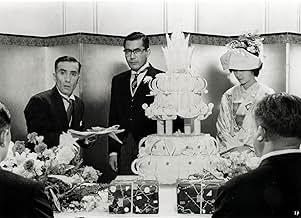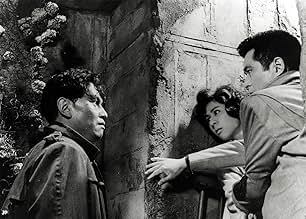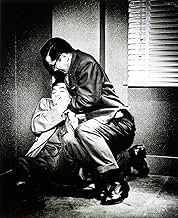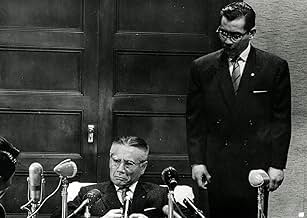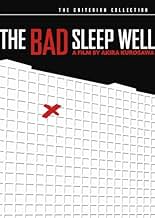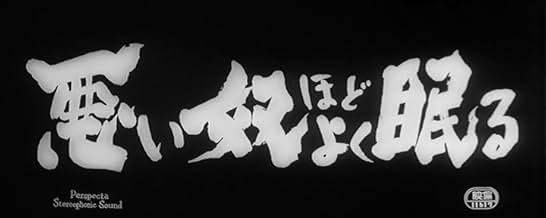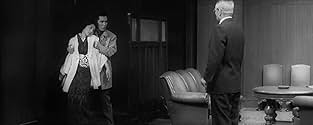AVALIAÇÃO DA IMDb
8,0/10
15 mil
SUA AVALIAÇÃO
Um jovem tenta usar a sua posição no coração de uma empresa corrupta para expor os homens responsáveis pela morte de seu pai. Uma história de Kurosawa sobre os escândalos corporativos no Jap... Ler tudoUm jovem tenta usar a sua posição no coração de uma empresa corrupta para expor os homens responsáveis pela morte de seu pai. Uma história de Kurosawa sobre os escândalos corporativos no Japão do pós-guerra.Um jovem tenta usar a sua posição no coração de uma empresa corrupta para expor os homens responsáveis pela morte de seu pai. Uma história de Kurosawa sobre os escândalos corporativos no Japão do pós-guerra.
- Direção
- Roteiristas
- Artistas
- Prêmios
- 3 vitórias e 1 indicação no total
Avaliações em destaque
Akira Kurosawa's "The Bad Sleep Well" is too dense and frankly too slow a film to qualify as a thriller in the usual sense. Although the elements are there - intrigue, double crosses, revenge, and crimes both naked and invisible - the pacing is too deliberate and there is little real suspense.
Yes, it's "Hamlet," though in a subtle, understated, Japanese way. Some of the characters are left out, but you'll eventually spot the Prince, Horatio, Ophelia, and Claudius. However, unlike his "Macbeth" ("Throne of Blood"), this is only a partial transposition and Kurosawa wisely does not carry the parallels too far.
Although it takes patience, the picture has its rewards. The performances are good, especially Masayuki Mori as the reptilian manipulator Iwabuchi, Kamatari Fujiwara as the hapless accountant Wada, and, as always, Takashi Shimura as master bureaucrat Moriyama. The sharp black-and-white cinematography gives the film a photo-journal aura of authenticity. And Masaru Sato's wonderful opening theme, heavy with menace and unease, certainly sets an appropriate tone.
Toshiro Mifune as Nishi/Hamlet is unusually restrained here, his normal fire largely internalized. He's adequate, but this casting against type doesn't really suit him.
"The Bad Sleep Well" is Kurosawa's attack on Japan's post-war business corruption that apparently was endemic by 1960 and perhaps still is today. His critique is harsh and unsparing, though one can't help but get the feeling that he's shooting at fish in a barrel.
Beyond the corruption of the corporate scandal, which the film literally headlines, is a strong sense of inner decay. Nearly everyone, regardless of their position, is uncomfortable. Even Iwabuchi, for all his power, must answer awkwardly to greater, unseen forces. Only the jackal-journalists who cover the opening wedding banquet seem immune to the pervasive uneasiness.
Yet all, save Nishi, are prepared to accept this state of affairs in return for their security. Ironically, Nishi himself seems most comfortable in an old air raid shelter in the ruins of a munitions plant, his own "castle", as it were, where he fights for honor as he understands it.
Recommended for Kurosawa fans and anyone interested in Japanese psyche, culture, or style. Those expecting a slam-bang 1940s Warner Brothers treatment will be extremely disappointed and probably won't last an hour.
Yes, it's "Hamlet," though in a subtle, understated, Japanese way. Some of the characters are left out, but you'll eventually spot the Prince, Horatio, Ophelia, and Claudius. However, unlike his "Macbeth" ("Throne of Blood"), this is only a partial transposition and Kurosawa wisely does not carry the parallels too far.
Although it takes patience, the picture has its rewards. The performances are good, especially Masayuki Mori as the reptilian manipulator Iwabuchi, Kamatari Fujiwara as the hapless accountant Wada, and, as always, Takashi Shimura as master bureaucrat Moriyama. The sharp black-and-white cinematography gives the film a photo-journal aura of authenticity. And Masaru Sato's wonderful opening theme, heavy with menace and unease, certainly sets an appropriate tone.
Toshiro Mifune as Nishi/Hamlet is unusually restrained here, his normal fire largely internalized. He's adequate, but this casting against type doesn't really suit him.
"The Bad Sleep Well" is Kurosawa's attack on Japan's post-war business corruption that apparently was endemic by 1960 and perhaps still is today. His critique is harsh and unsparing, though one can't help but get the feeling that he's shooting at fish in a barrel.
Beyond the corruption of the corporate scandal, which the film literally headlines, is a strong sense of inner decay. Nearly everyone, regardless of their position, is uncomfortable. Even Iwabuchi, for all his power, must answer awkwardly to greater, unseen forces. Only the jackal-journalists who cover the opening wedding banquet seem immune to the pervasive uneasiness.
Yet all, save Nishi, are prepared to accept this state of affairs in return for their security. Ironically, Nishi himself seems most comfortable in an old air raid shelter in the ruins of a munitions plant, his own "castle", as it were, where he fights for honor as he understands it.
Recommended for Kurosawa fans and anyone interested in Japanese psyche, culture, or style. Those expecting a slam-bang 1940s Warner Brothers treatment will be extremely disappointed and probably won't last an hour.
At the start of this film I didn't know what to expect. I thought it might be a mediocre Kurosawa film. By the end of the film I realized it was one of his best. This film about familial discord and corporate manipulation is breathtaking. Its filled with irony, double crosses, cynicism, manipulation and revenge. In short, its endlessly interesting and captivating. Definitly a must see.
10maurazos
I am watching Kurosawa's full collection and the more I watch, the more I love the art of "The Emperor". And unlike many Kurosawa's fans, my preferred films are those that talk about the time Kurosawa lived, not about the samurai ages. Again, Kurosawa uses the literature classics (for this film, Shakespeare's "Hamlet") as a source for his stories, proving that the subjects they talked about are still modern. Anyway, the genius of Kurosawa is quite big to make their film be not just a cinema remake of those texts, but an original, exciting plot. And again, Kurosawa gives us a film with a clear and worrying social message, a denounce to a serious problem (company and state corruption that even today still darkens the image of a "100% legal" Japan). A film to enjoy and film to learn about Japanese society and life in a general way.
The Bad Sleep Well is one of the best revenge movies of all time. It stars the great Toshiro Mifune as a man seeking revenge against the people who forced his father into committing suicide. Unlike many revenge movies, The Bad Sleep Well doesn't glamorize its subject. Instead it shows how in trying to get retribution for a man who is now dead, Mifune ends up injuring himself and other people he loves who are still alive. There are a lot of beautiful and haunting images, like when we see a desperate man struggling to climb a volcano so he can throw himself in, or a number of scenes that are shot at the bombed out wreckage of an old WWII munitions plant. The bleak landscape mirrors the damaged lives of the movie's characters. Powerful and haunting, this is a movie that will follow you for days.
For his first film made by his own independent production company, Kurosawa decided to take advantage of his new creative freedom to make his most politically daring picture to date. He takes on the corruption rife in corporate Japan in a film noir of almost epic proportions.
This was Kurosawa's most stylised film so far. He takes a nasty, tragic film noir plot-line (and yes, there are elements of Hamlet, but not enough to call it an adaptation) but plays it at some times as if it was a farcical comedy, and at others like it was a horror. The villainous characters appear slightly ridiculous and even cartoonish. Only the most senior amongst them, Iwabuchi, is allowed to keep his dignity. While the others are just puffed-up minions, easily toppled, Iwabuchi seems truly immovable.
The establishing scenes are the film's strongest. It opens, like The Godfather, with a lengthy wedding scene which serves to introduce all the principle characters and set the tone. Everything about the way this scene is put together tells us this is not the happy occasion it should be the hall where the ceremony takes place echoes off-puttingly, a company official about to make a speech cringes as champagne corks go off behind him like gun shots. Add to this an interruption from the police, a gang of journalists and photographers waiting in the wings, and a best man's speech that turns from jokes to threats, and you can practically taste the corruption and decadence that is the focus for this story.
The wedding scene is followed by a montage of newspaper headlines and newsreel footage, reminiscent of similar devices used by Frank Capra and Raoul Walsh. Kurosawa brilliantly choreographs this sequence to music, a rather eerie little dirge more typical of a Japanese period piece than a modern thriller. It's the only example of this kind of montage I know of in Kurosawa's work (it was rare for him to expand the narrative to the bigger picture), but it's a highly effective one-off.
The central plot, of Nishi (Toshiro Mifune) orchestrating spectacular revenge against the men who killed his father, is full of amazing set-pieces. There are echoes of Hitchcock in the way Kurosawa shoves significant objects right up to the camera. The use of music is dazzling, combining upbeat music with unnerving moments to give a great sense of irony. Nishi is the last person the villains suspect, and he often appears innocently in the background with little more significance than an extra, although of course the audience knows better. It's a nice touch that Kurosawa has the character wear glasses, making Mifune almost unrecognisable to us as well.
Sadly, the film's pace slows down after the first hour, and rarely gets back to the same dizzying heights for the rest of its 145 minutes. The lengthy runtime does however allow Kurosawa to add a depth that is absent from your average 100-minute Hollywood Film Noir. Kurosawa could be bleak, but he never forgot the humanity in his films, and this is really the focus in the second half of the film. He takes time to put the spotlight on the innocent victims of revenge (Nishi's wife, Wada's family), and even show the arch-villain in moments of warmth and tenderness with his family. And this is perhaps where the story's biggest similarity with Hamlet is Nishi's revenge falls apart because he is unable to be totally ruthless and unfeeling.
As for the acting, Masayuki Mori is particularly good as Iwabuchi. Just look at his reaction when the second wedding cake pulls up behind him remaining calm, but clearly suppressing concern and annoyance. Kamatari Fujiwara and Akira Nishimura give great over the top performances as Wada and Shirai respectively. Unfortunately this is not one of Toshiro Mifune's great performances. Mifune had an incredible range, but somehow he doesn't quite work as Nishi. In particular, for me he doesn't quite get the emoting right when he begins to realise his feelings for his wife.
Kurosawa always liked to be making some kind of point with all his films, something which sometimes got in the way of decent storytelling. The Bad Sleep Well is a political soapbox picture if ever there was one, but luckily in this case that doesn't water it down quality-wise. True, it is perhaps a little too long, and there are a few dull stretches, but Kurosawa's direction was still at its peak and this stands as one of his best contemporary-set pictures.
This was Kurosawa's most stylised film so far. He takes a nasty, tragic film noir plot-line (and yes, there are elements of Hamlet, but not enough to call it an adaptation) but plays it at some times as if it was a farcical comedy, and at others like it was a horror. The villainous characters appear slightly ridiculous and even cartoonish. Only the most senior amongst them, Iwabuchi, is allowed to keep his dignity. While the others are just puffed-up minions, easily toppled, Iwabuchi seems truly immovable.
The establishing scenes are the film's strongest. It opens, like The Godfather, with a lengthy wedding scene which serves to introduce all the principle characters and set the tone. Everything about the way this scene is put together tells us this is not the happy occasion it should be the hall where the ceremony takes place echoes off-puttingly, a company official about to make a speech cringes as champagne corks go off behind him like gun shots. Add to this an interruption from the police, a gang of journalists and photographers waiting in the wings, and a best man's speech that turns from jokes to threats, and you can practically taste the corruption and decadence that is the focus for this story.
The wedding scene is followed by a montage of newspaper headlines and newsreel footage, reminiscent of similar devices used by Frank Capra and Raoul Walsh. Kurosawa brilliantly choreographs this sequence to music, a rather eerie little dirge more typical of a Japanese period piece than a modern thriller. It's the only example of this kind of montage I know of in Kurosawa's work (it was rare for him to expand the narrative to the bigger picture), but it's a highly effective one-off.
The central plot, of Nishi (Toshiro Mifune) orchestrating spectacular revenge against the men who killed his father, is full of amazing set-pieces. There are echoes of Hitchcock in the way Kurosawa shoves significant objects right up to the camera. The use of music is dazzling, combining upbeat music with unnerving moments to give a great sense of irony. Nishi is the last person the villains suspect, and he often appears innocently in the background with little more significance than an extra, although of course the audience knows better. It's a nice touch that Kurosawa has the character wear glasses, making Mifune almost unrecognisable to us as well.
Sadly, the film's pace slows down after the first hour, and rarely gets back to the same dizzying heights for the rest of its 145 minutes. The lengthy runtime does however allow Kurosawa to add a depth that is absent from your average 100-minute Hollywood Film Noir. Kurosawa could be bleak, but he never forgot the humanity in his films, and this is really the focus in the second half of the film. He takes time to put the spotlight on the innocent victims of revenge (Nishi's wife, Wada's family), and even show the arch-villain in moments of warmth and tenderness with his family. And this is perhaps where the story's biggest similarity with Hamlet is Nishi's revenge falls apart because he is unable to be totally ruthless and unfeeling.
As for the acting, Masayuki Mori is particularly good as Iwabuchi. Just look at his reaction when the second wedding cake pulls up behind him remaining calm, but clearly suppressing concern and annoyance. Kamatari Fujiwara and Akira Nishimura give great over the top performances as Wada and Shirai respectively. Unfortunately this is not one of Toshiro Mifune's great performances. Mifune had an incredible range, but somehow he doesn't quite work as Nishi. In particular, for me he doesn't quite get the emoting right when he begins to realise his feelings for his wife.
Kurosawa always liked to be making some kind of point with all his films, something which sometimes got in the way of decent storytelling. The Bad Sleep Well is a political soapbox picture if ever there was one, but luckily in this case that doesn't water it down quality-wise. True, it is perhaps a little too long, and there are a few dull stretches, but Kurosawa's direction was still at its peak and this stands as one of his best contemporary-set pictures.
Você sabia?
- CuriosidadesThe ideas for the film came from Akira Kurosawa's nephew, Mike Y. Inoue, who wanted to be a scriptwriter and was giving his scripts to his uncle. Kurosawa liked it and made suggestions, to which Inoue spent six months rewriting the script under the title "Bad Men's Prosperity." Kurosawa, along with several others, reworked it even more into the final version, though Inoue did not receive screen credit.
- Erros de gravaçãoWhen Nishi is trying to push Shirai out of the window, the brick wall outside of the window moves around - a lot.
- Citações
Koichi Nishi: It's not easy hating evil. You have to stoke your own fury until you become evil yourself.
- Versões alternativasOriginally released at 151 in Japan; USA version removes 16 minutes of footage.
- ConexõesFeatured in WatchMojo: Top 10 Movies You Didn't Know Borrowed from Shakespeare (2016)
- Trilhas sonorasBridal Chorus
(uncredited)
from "Lohengrin"
Music by Richard Wagner
Played at the end of the wedding ceremony
Principais escolhas
Faça login para avaliar e ver a lista de recomendações personalizadas
- How long is The Bad Sleep Well?Fornecido pela Alexa
Detalhes
Bilheteria
- Orçamento
- JP¥ 82.540.000 (estimativa)
- Faturamento bruto nos EUA e Canadá
- US$ 46.808
- Fim de semana de estreia nos EUA e Canadá
- US$ 15.942
- 28 de jul. de 2002
- Faturamento bruto mundial
- US$ 47.023
- Tempo de duração
- 2 h 31 min(151 min)
- Cor
- Proporção
- 2.35 : 1
Contribua para esta página
Sugerir uma alteração ou adicionar conteúdo ausente


